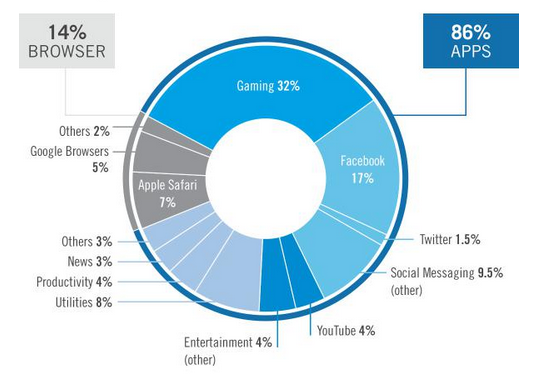Derek Thompson writes: In 2011, Hal Varian, the chief economist at Google, wanted to study the millions of hours saved by Google searches. His team took questions like, Does using butter or margarine affect the size of baked cookies? and compared the time it took to Google the results versus researching the answers offline, in cookbooks.
Varian concluded that the typical Google question saved 15 minutes. In 2011, the mobile advertising market was a pittance. Today, it’s a $7 billion industry, and mobile devices now command 20 percent of our attention, more than radio and print combined. Google has used its time-saving, bottom-of-funnel advantage to become, by a wide margin, the richest company in mobile advertising.
Facebook, too, is an engine of consumer surplus, but it earns its prodigious income by monetizing time spent, rather than time saved. A full account of hours logged on Apple and Android mobile devices finds that, when you take out gaming and browsers, Facebook accounts for approximately a third of our time on mobile devices. Even more monopolistically, the four most-downloaded non-gaming apps today—Facebook Messenger, Facebook, WhatsApp, and Instagram—are Facebook, built by Facebook, or bought by Facebook.
How Do People Spend Their Time on iOS and Android Devices?

An easy conclusion to draw from this is that Facebook is mobile, and mobile is Facebook, and the future of our attention belongs to Facebook.
But that projection is based on a theory of monetizing time that says that more time is always more valuable for all media companies. And that’s not necessarily true. The single richest company on mobile, Google, makes more than twice as much money on mobile advertising than Facebook does, on less than half the time. This suggests that there is still considerable room for mobile innovations, even in media, that are designed around saving time rather than taking time.
You might say I’m making a false comparison, because Facebook is a media company, and Google is a search company, and the former category is all about soaking up time that the latter category saves. But that dichotomy is misleading.
As media companies search for a “God metric” to brag about to advertisers, many of them are converging on “engaged time.” There are good reasons for this. The minutes people spend on an article page says something more about readers’ concerted attention than raw page views and upvotes. But time is a war that Facebook is winning in a blowout. As News Feed proves itself to be a most ingenious engine of engaged attention, maybe competitors should be changing the argument. Even with all the time in the world, most of us would still like to save some.
